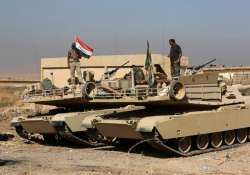Dislodging ISIS from Mosul a ‘significant strategic gain’: US
The United States today said that dislodging the terror group Islamic State from its self-declared capital, Mosul, will be a ‘significant strategic gain’.

The United States today said that dislodging the terror group Islamic State from its self-declared capital, Mosul, will be a ‘significant strategic gain’.
“I think the President (Barack Obama) would be the first to acknowledge that this is a significant test, given the population size of Mosul, given the large geographic area that it encompasses,” White House Press Secretary Josh Earnest told reporters yesterday.
“The symbolic importance that the ISIL (ISIS) has invested in their control of Mosul, dislodging them from the city would be a significant strategic gain. That's why the US and our Iraqi partners have been working so closely over the last several months to prepare for this operation," Earnest added.
The long-awaited offensive to retake Mosul from the Islamic State has begun with a volley of US-led coalition airstrikes and heavy artillery bombardments on a cluster of villages along the edge of Iraq's historic Nineveh plain east of the militant-held city.
Iraq's Kurdish peshmerga fighters led the initial assault yesterday, advancing slowly across open fields littered with booby-trapped explosives as plumes of black and orange smoke rose overhead - the opening phase of an unprecedented campaign expected to take weeks if not months, and involve more than 25,000 troops. By the end of the day Kurdish forces had retaken some 200 square kilometres, according to the president of Iraq's Kurdistan region.
Acknowledging that the battle for Mosul is the next test because progress has already been made on the ground in Iraq, and there have been cities like Ramadi and Tikrit that were retaken from ISIS, he said, "These were significant cities, significant in their population size, that Iraqi security forces did succeed in dislodging ISIL from. They did that with the support of United States and our coalition partners."
Responding to a question, the White House official said that he is not aware that any sort of specific timeframe has been laid out for when the operation would be completed.
"Obviously, this represents the next important step in our campaign against ISIL in Iraq. The US has mobilised a 67-member coalition to support the Iraqi government and Iraqi security forces as they seek to rid ISIL from their country," he added, using another acronym for the ISIS.
Mosul is the second largest city in Iraq. It was the city where ISIL's leader announced their unfulfilled intent to form a caliphate.
“It is now the last major centre of ISIL in Iraq," Earnest said.
Asserting that the campaign has been months in the making and there have been a number of important steps taken by the
Iraqi security forces with the strong support of the US and its allies, he said the assault is an important part of the broader effort to ultimately destroy ISIS.
"It's an indication that the effort is moving forward but there's still a lot of important work to be done before that goal will be realised, even inside of Iraq," he added.
The White House's reaction came after the Iraqi government announced that its security forces with the support of the counter-ISIS coalition began operations to liberate the northern Iraqi city of Mosul, the self-declared capital and the last major stronghold of the dreaded group.
Terming the operation a "decisive moment" in the counter- ISIS campaign, Pentagon Press Secretary Peter Cook has said,
"Mosul is also historically a diverse, multi-ethnic, multi-sectarian city, precisely the opposite of ISIL's hate-filled ideology, so it carries a great deal of symbolic importance in this fight as well."
Iraq's second-largest city, Mosul fell to ISIS in the summer of 2014 as the militants swept over much of the country's north and central areas. Weeks later the head of the extremist group, Abu Bakr al-Baghdadi, announced the formation of a self-styled caliphate in Iraq and Syria from the pulpit of a Mosul mosque.
If successful, the liberation of the city would be the biggest blow yet to the Islamic State group. After a string of victories by Iraqi ground forces over the past year, ISIS now controls less than half the territory it once held, and Iraqi Prime Minister Haider Al-Abadi has pledged the fight for Mosul will lead to the liberation of all Iraqi territory from the militants this year.
With Agency Inputs